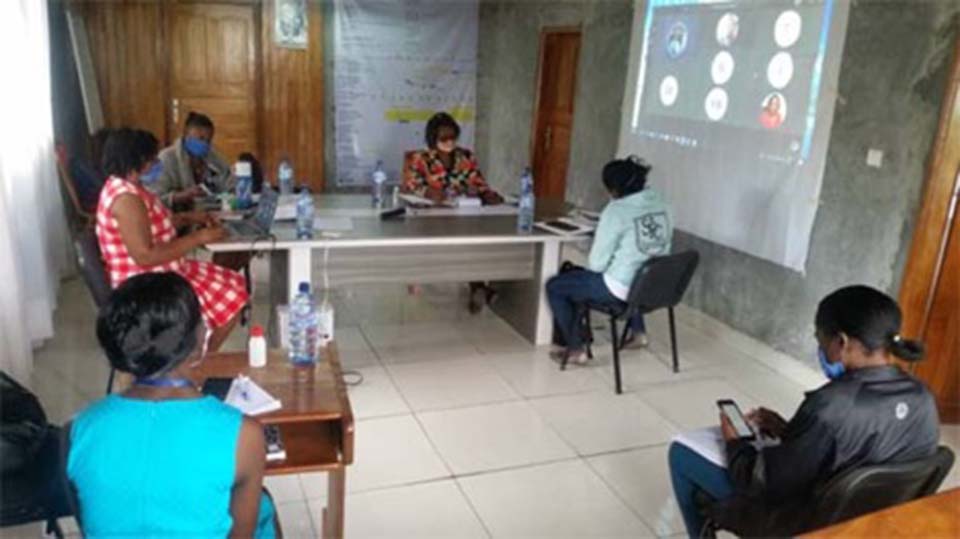

Protecting HIV Patients From Coronavirus in Cameroon
Catholic Relief Services has been working in Cameroon with the support of the U.S. President’s Emergency Plan for AIDS Relief, or PEPFAR, since 2014. We support orphans and vulnerable children and their families living with or affected by HIV. The initiative has saved over 18 million lives, prevented millions of HIV infections, and accelerated progress toward controlling the HIV and AIDS in more than 50 countries.
However, that work has been complicated by the COVID-19 pandemic. The concern is that COVID-19 will lead to a spike in AIDS-related deaths.

KIDSS case workers participate in a virtual case management training during COVID-19.
Photo courtesy of KIDDS
The Key Interventions to Develop Systems and Services for Orphans and Vulnerable Children project, or KIDSS, aims to strengthen government health and community networks to support children and their families affected by HIV in 32 health districts in 9 out of 10 regions of Cameroon, and reduce an HIV epidemic in the country.
As the COVID-19 pandemic began, Marie, pregnant with her second child, felt the anxiety that billions of people across the world experienced. Suddenly, the future seemed very uncertain in this new era of the coronavirus.
Marie is also HIV positive and caring for an HIV positive child. Dependent on continuous testing and lifesaving medications she was concerned she would no longer be able to access these critical services.
To ensure that support for people living with HIV continued when COVID-19 cases were reported in Cameroon, KIDSS quickly re-strategized their service delivery approaches. Traditionally within the program, case workers visit program participants within their homes, engaging in face-to-face consultations — an activity that was halted to ensure safety for staff and program participants from COVID-19 transmission. The project adapted by conducting rapid assessments which were administered virtually. Additionally, counseling support services were provided through voice calls and messaging. To ensure that life-saving drugs continued to reach people with HIV, when COVID-19 cases were first reported in Cameroon, CRS adjusted its HIV programming to support home delivery of antiretroviral therapies and testing services.
My hope is that we continue to do this important work with passion because we are probably the only health care workers thinking of these children right now.
The project also responded to the need for awareness among people with HIV to ensure they are protected from COVID-19. Prevention messaging was integrated into training for partners and caseworkers for use during consultations. Protective materials including masks were also shared with partners where face-to-face meetings were required.
“The overall goal is to understand the needs of the family and provide additional support to strengthen them, to make them really resilient in the long run,” says Dr. Leslie Chingang, deputy chief of party program quality for KIDSS.
“HIV diminishes a family’s economic potential. All resources for the family can end up paying for medical care. Along with stigma attached, access to good quality medical services and continual treatment to achieve adherence are some of the problems people living with HIV face. You need to address the needs of the child and the caregiver who is responsible so that the child can remain healthy, reduce episodes of illness, go back to school, do well in school and reduce absences at school.”
To better equip staff and partners to support program participants remotely, a four-day training was held at various locations and involved over 120 KIDSS project staff and community workers. The training integrated social distancing and hygiene protocols. The training aimed to strengthen case worker ability to adopt remote monitoring and services delivery to project participants as well as enhancing their knowledge on case management practices.
“Using digital solutions to provide virtual training has proven to be a successful approach during crisis situations similar to the COVID-19 pandemic, as evidenced by the training outcome results,” says Joel Kuria, a KIDDS MEAL director. “The lessons learned through this experience go a long way in strengthening the project’s resolve to pursue continuous mentorship and trainings of the workforce and to be able to support vulnerable children and families living with HIV.”
“My hope is that we continue to do this important work with passion because we are probably the only health care workers thinking of these children right now,” says Dr. Leslie Chingang. “The focus now in the country is on COVID-19. There are children who still need to be on medication, who are not being treated. My role is to be an advocate, to remind and engage the health community not to forget these children and what we are achieving.”
Catholic Relief Services has reached 50,000 children and their families in Cameroon thanks to the support of USAID’s PEPFAR program, and Church and civil society partnerships of the Cameroonian government.

